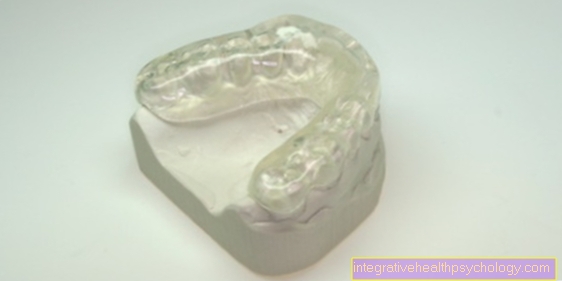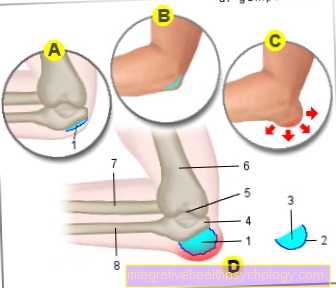What does a urologist do?
Definition - What is a Urologist?
A urologist is a doctor who deals with the urinary and urinary organs of the body. These include the kidneys, ureters, bladder, and urethra. In addition to the urine-specific organs of both sexes, a urologist also deals with the gender-specific organs of men. This includes testicles, epididymis, prostate, seminal vesicles, spermatic ducts and the penis. In order to be able to be called a urologist, the doctor must complete further training in the field of urology and thereby become a specialist in urology.

education
In order to become a urologist, every doctor must first complete the basic studies in human medicine. The basic course lasts six years and is divided into a two-year pre-clinical course, a three-year clinical course and a one-year “practical year”. If all examinations are successfully completed within this basic course, the doctor can obtain his license to practice medicine and then begin the specialist training.
The specialist training takes another five years. During these five years, the aspiring urologist has to carry out a large number of operations and examinations independently. If these requirements are met, the doctor is admitted to his final exam and can take it. If the exam is successful, he will be awarded the title “Specialist in Urology”.
Even as a specialist in urology, a doctor can and must complete advanced training. These should guarantee that every specialist is up to date and is always informed about new technologies. In the form of further training, the urologist can become a pediatric urologist or a certified men's doctor, for example.
What Makes a Doctor Conservative?
A urologist can perform both conservative and operative diagnostics and therapy. Conservative diagnostics include all diagnostic methods for which no surgical intervention is necessary. Examples of this are preventive examinations with urine tests, PSA value determinations, ultrasound and X-ray diagnostics or the typical laboratory tests with infection and fertility tests.
In addition to conservative diagnoses, conservative therapies can also be carried out. This can include, for example, tumor follow-up care, treatments for urinary incontinence, bladder and renal pelvic infections, and individual pain therapy.
Read more on this topic at: Pelvic inflammation
The conservative tasks of a urologist also include examining men's health and clarifying unfulfilled wishes for children and infertility. Studies of men's health relate mainly to erectile dysfunction or age-related problems in men.
Read more on this topic at: Erectile dysfunction
Urinalysis
Urine tests are one of the basic diagnostic methods in both urology and general medicine. The examination of the urine is intended to provide information about the composition and quality of the urine, which allows conclusions to be drawn about possible diseases (e.g. inflammation, diabetes mellitus). The urine sample is usually taken from the midstream urine.
In particular, glucose, protein, nitrite, bacteria, pathogens or even blood can be examined in the urine samples and thus conclusions can be drawn.
Read more on this topic at:
- Urinalysis
- Blood in the urine
- Bacteria in the urine
What does a urologist do surgically?
Operative urology can be differentiated from conservative urology. Surgical urology includes those therapies for which a surgical intervention is necessary.
The most common surgical urological intervention is the operation of urological tumors. These include prostatectomy, in which the entire prostate is removed from prostate tumors, or surgical interventions for urinary bladder or kidney tumors. Surgical interventions for testicular tumors are also counted as surgical urology. In addition to surgical interventions, tumors of the prostate, testicles and urinary bladder can also be treated with endoscopic interventions if necessary. Endoscopic procedures usually have a faster healing time, but are not suitable for every urological procedure.
Read more on this topic at: Prostate cancer
In addition, urinary bladder and ureter stones can block the respective urine drainage systems, which may also require surgery. The stones are mostly smashed by endoscopic, minimally invasive interventions so that the drainage system is exposed again.
Read more on this topic at: Ureteral stone
In the case of urinary incontinence, surgical therapy can be carried out as an alternative to conservative therapy. So-called transobturator ligaments are inserted into the bladder, which can restore urinary continence.
Smaller surgical interventions can also be carried out on an outpatient basis in the urology department. These include circumcision, also known as "circumcision", or vasectomy, i.e. sterilization of the man by cutting through the spermatic duct.
Read more on this topic at: Circumcision in men
vasectomy
Translated into German, a vasectomy means “removing vessels”. In medicine, however, vasectomy usually means the removal or severing of very specific vessels, namely the vas deferens. By severing the male spermatic duct, the man can no longer pass his sperm into the penis, which consequently corresponds to sterilization.
Vasectomy is not an absolute guarantee of contraception, but it is one of the safest and especially permanent methods of contraception. A re-fertilization operation, i.e. a reverse operation, also has a relatively high success rate. If the vasectomy was less than five years ago, a success rate of almost 95% is given.
Read more on this topic at: vasectomy
How do I find a good urologist?
Various rating portals can help you find a good urologist. The best-known rating portals on the Internet include jameda.de, urologenportal.de, sanego.de and werbekanntdenbesten.de. The werbekanntdenbesten.de site has the advantage that all ratings from the aforementioned rating portals are already summarized there.
Patients who have already been treated can indicate their satisfaction with the treating urologist on the portals. An attempt can be made to infer the competence and reliability of the doctor through many different evaluations.
Can you believe the rating portals?
In general, you should always question the ratings on the rating portals. In order to gain a little more certainty about the honesty and correctness of the reviews, particular attention should be paid to the number of reviews and their content. The more reviews there are on the portal, the more likely it is to be assumed that the majority of reviews can be traced back to actually honest patients and thus reflect the satisfaction with the respective doctor. There is no control as to whether the reviews were actually written by a treated patient, so any non-patient can write a good or negative review to artificially improve or worsen the overall evaluation.
Why are there more male urologists than female urologists?
Urology is often referred to as the so-called "male domain". This is due to the fact that only about a sixth of all working urologists are women, and accordingly more than three quarters are men. This strong imbalance is probably due to the fact that the majority of all patients are male.
Urology also deals with the kidneys, the ureters, the bladder and the urethra, so that both men and women visit the urologist in the event of complaints, but the urologist also deals with the male reproductive organs, i.e. testicles, prostate, penis, seminal vesicles etc., while the gynecologist or gynecologist is responsible for the female genital organs.
Although women can presumably perform just as good diagnoses and therapies on the male sex as men on the female sex, such examinations are considered very intimate and are therefore preferably carried out by their own gender.
What examinations does the urologist perform on the prostate?
The prostate is counted among the male genital organs and should be examined regularly in every man over the age of 45, as prostate cancer is an extremely common cause of death in men. A rectal approach is recommended for minimally invasive access to the prostate. The basic examination during such a preventive examination consists of a simple palpation of the prostate, an ultrasound examination and the determination of the PSA value.
During the palpation examination, particular attention is paid to the shape, size and consistency of the prostate. If hardening, nodules and asymmetrical shapes can be felt, this can be an indication of a tumor.
During the ultrasound examination, an ultrasound probe is inserted through the anus into the rectum and held onto the prostate. The ultrasound can identify the size of the prostate and any nodules.
No direct prostate intervention is necessary to determine the PSA value. The PSA value can easily be determined in the blood. If the PSA values are elevated, this can indicate a tumor.
If the above diagnoses indicate a possibly malignant tumor, several tissue samples are then taken. These can provide certainty about the abnormalities of the prostate. In general, however, a large number of apparently dangerous enlargements, asymmetries or elevated PSA values are often completely harmless and not malicious.
Read more on this topic at:
- Prostate cancer
- Prostate enlargement
- Examination of the prostate
What is andrology?
Andrology is a medical specialty that specializes in the reproductive function of men and their disorders. Andrologists are therefore often referred to as "gynecologists for men". Another synonym for andrology is the so-called "men's medicine".
So the andrologist deals with the sexual organs of men. This includes both the internal and external genital organs. In andrology, particular attention is paid to the man's fertility. Unwanted children play a special role here.
Another central issue in andrology is hormone production in the testes. The testosterone produces the sex hormone testosterone, which plays a crucial role in male fertility. A lack of testosterone can on the one hand impair the man's wellbeing and on the other hand, crucial functions of the body can no longer be carried out.
Andrologists also diagnose and treat erectile function or erectile dysfunction. Such dysfunctions are usually due to psychological reasons, high blood pressure values, cancer or other metabolic diseases.
A last big point in andrology is the methods of contraception or sterilization of men through vasectomies.
Read more on this topic at:
- Erectile dysfunction
- Therapy of erectile dysfunction
- Causes of Erectile Dysfunction
How can the urologist help if you want to have children?
In about 30% of cases, a couple's infertility can be traced back to the man. The reason for this is usually found in a reduced amount or poor quality of the sperm. In the case of infertility, a further distinction is made between permanent and temporary infertility.
The urologist can examine the male genital organs through anamnesis and diagnostics for any abnormalities. Depending on the cause of the infertility, various therapies can be used to achieve fertility.
For example, if the infertility is due to high blood pressure, simple medication or changes in lifestyle can already promote fertility. Smoking and alcohol can also negatively affect man's fertility. If the sex hormone level in the man is too low, intervention can be made by administering these hormones artificially.
If none of these therapeutic options lead to the desired success, in-vitro fertilization or intracytoplasmic sperm injection can still be used. However, this is not carried out by a urologist but by doctors who specialize in it.
Additional informationMore information on this topic:
- Diseases of the testicles
- Problems urinating
- Incontinence
You can find more detailed information on grossesblutbild.de under examinations in urology.












.jpg)
















